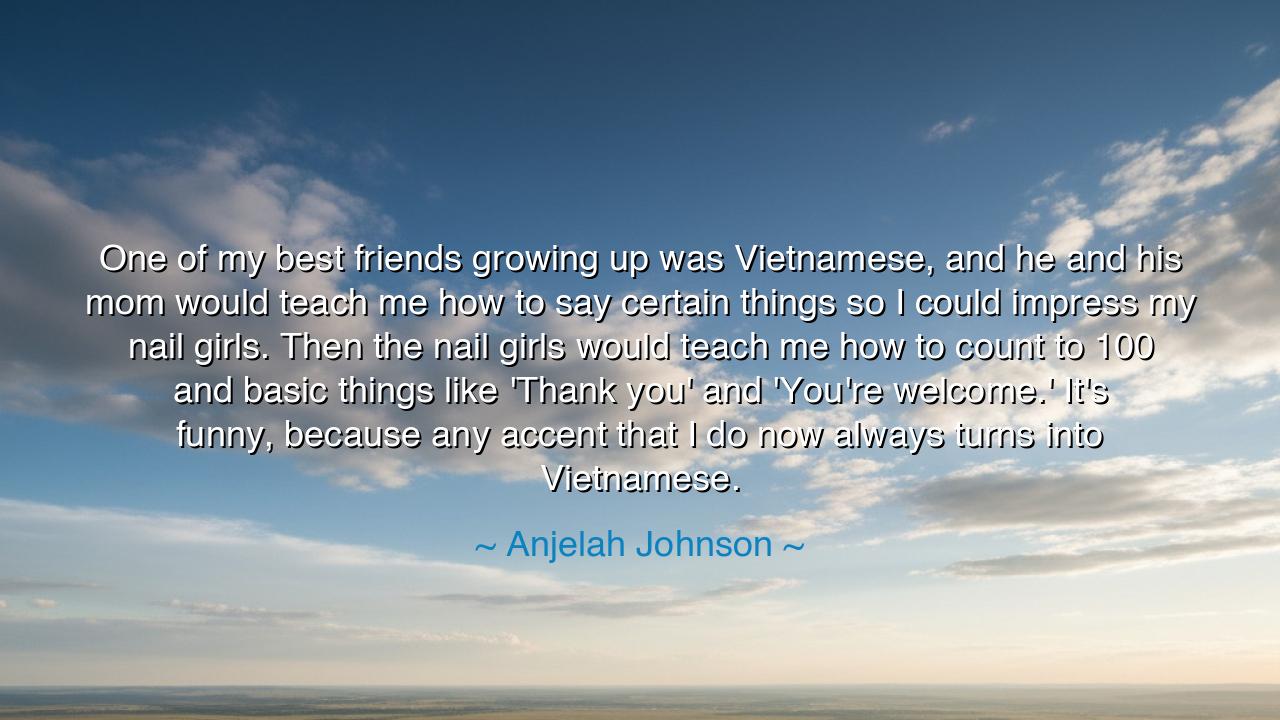
One of my best friends growing up was Vietnamese, and he and his
One of my best friends growing up was Vietnamese, and he and his mom would teach me how to say certain things so I could impress my nail girls. Then the nail girls would teach me how to count to 100 and basic things like 'Thank you' and 'You're welcome.' It's funny, because any accent that I do now always turns into Vietnamese.






Anjelah Johnson, with humor yet with truth, once shared: “One of my best friends growing up was Vietnamese, and he and his mom would teach me how to say certain things so I could impress my nail girls. Then the nail girls would teach me how to count to 100 and basic things like ‘Thank you’ and ‘You’re welcome.’ It’s funny, because any accent that I do now always turns into Vietnamese.” What may sound like a lighthearted memory carries within it the timeless wisdom of how cultures shape one another, how friendship bridges difference, and how language is a gift that can both honor and transform.
The ancients knew that to learn another’s tongue is to touch the heart of their world. The Greeks who learned the speech of Egyptians gained not only words but wisdom from a civilization older than their own. The Romans, when they adopted Greek language and letters, transformed themselves into heirs of philosophy and art. So it is with Johnson’s story: as a child, she did not merely play alongside her Vietnamese friend, she absorbed the rhythms of his home, the care of his mother, the generosity of the women at the nail salon. Each word they shared was more than instruction—it was initiation into another way of seeing.
Her laughter—“any accent that I do now always turns into Vietnamese”—reveals a deeper truth. What we learn in youth becomes woven into the fabric of our being. The accents, the phrases, the gestures of childhood stay with us like shadows of the soul. To carry the echo of the Vietnamese tongue in every impersonation is not mockery but memory—it is the proof of influence, the way another culture leaves its imprint upon us forever.
Consider the story of Marco Polo, who journeyed across Asia and returned to Venice with tales, foods, and words that would forever change the West. His very speech became infused with the languages he encountered, so that he carried not only his own homeland but the resonance of distant peoples. So too does Johnson’s story, though rooted in small things—phrases of gratitude, numbers up to 100—reflect the larger truth: even the smallest exchanges of culture become seeds that grow into lifelong marks.
Her words also touch on the humility of learning. She recalls being taught “Thank you” and “You’re welcome,” the simplest of courtesies. Yet it is in these small courtesies that entire bridges are built. To speak to another in their own language, however humbly, is to honor them, to say: I see you, I respect you, I want to meet you where you are. The ancient philosophers often said that gratitude was the root of virtue. By learning to say “thank you” in another’s tongue, Johnson lived that virtue in a quiet and enduring way.
Yet, we must also see the lesson of responsibility. To carry another culture’s sounds within oneself is a gift, but also a duty—to remember that these words are not toys, but treasures of identity. To use them with respect, to let them remind us of friendship and shared humanity, is to keep faith with those who gave them. Johnson’s memory, told in humor, can remind us all: never treat lightly the inheritance of another’s heritage; honor it in the way you carry it forward.
The lesson, then, is this: friendship and language are bridges that outlast time. The words taught to you in kindness, the cultural gifts shared with you in trust, remain forever, shaping how you speak, how you think, how you remember. Do not dismiss them as trivial. Learn them, use them with reverence, and let them guide you toward deeper respect for all peoples. For in every borrowed phrase lies a bond, in every shared accent lies a reminder: we are all shaped by more than ourselves.
So let us live with gratitude for those who teach us their words and ways. Let us laugh, as Johnson does, at the quirks of memory, but let us also stand in awe of the truth they reveal: that cultures mingle in the simplest places—between friends, in the home, at the salon, in the ordinary passing of words. And from such small beginnings, whole lives are marked, entire hearts are changed.






AAdministratorAdministrator
Welcome, honored guests. Please leave a comment, we will respond soon